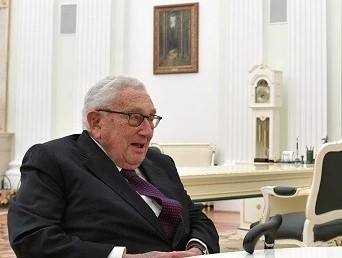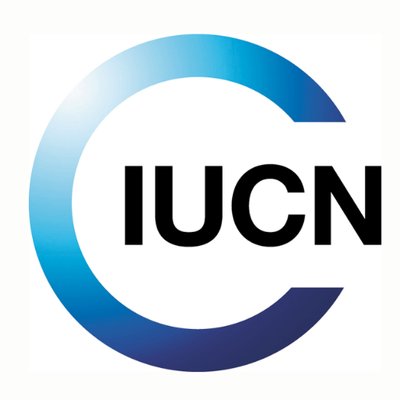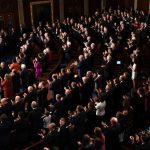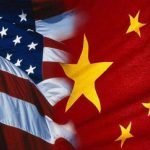A Jew who fled Nazi Germany with his family, Kissinger in his later years cultivated the reputation of respected statesman, offering advice to Republicans and Democrats alike…reports Asian Lite News
Former Secretary of State Henry Kissinger, the diplomat with the thick glasses and gravely voice who dominated foreign policy as the United States extricated itself from Vietnam and broke down barriers with China, died Wednesday, his consulting firm said. He was 100.
With his gruff yet commanding presence and behind-the-scenes manipulation of power, Kissinger exerted uncommon influence on global affairs under Presidents Richard Nixon and Gerald Ford, earning both vilification and the Nobel Peace Prize. Decades later, his name still provoked impassioned debate over foreign policy landmarks long past.
Kissinger’s power grew during the turmoil of Watergate, when the politically attuned diplomat assumed a role akin to co-president to the weakened Nixon.
“No doubt my vanity was piqued,” Kissinger later wrote of his expanding influence. “But the dominant emotion was a premonition of catastrophe.”
A Jew who fled Nazi Germany with his family in his teens, Kissinger in his later years cultivated the reputation of respected statesman, giving speeches, offering advice to Republicans and Democrats alike and managing a global consulting business. He turned up in President Donald Trump’s White House on multiple occasions. But Nixon-era documents and tapes, as they trickled out over the years, brought revelations — many in Kissinger’s own words — that sometimes cast him in a harsh light.
Never without his detractors, Kissinger after he left government was dogged by critics who argued that he should be called to account for his policies on Southeast Asia and support of repressive regimes in Latin America.
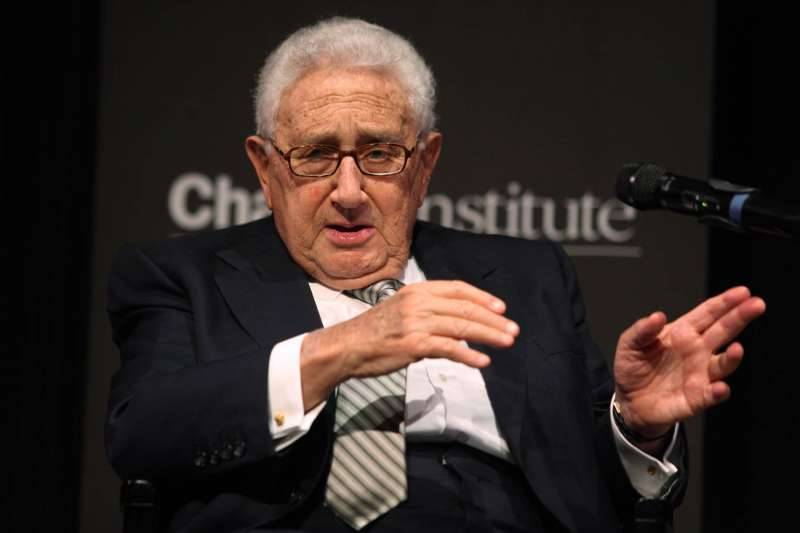
For eight restless years — first as national security adviser, later as secretary of state, and for a time in the middle holding both titles — Kissinger ranged across the breadth of major foreign policy issues. He conducted the first “shuttle diplomacy” in the quest for Middle East peace. He used secret channels to pursue ties between the United States and China, ending decades of isolation and mutual hostility.
He initiated the Paris negotiations that ultimately provided a face-saving means — a “decent interval,” he called it — to get the United States out of a costly war in Vietnam. Two years later, Saigon fell to the communists.
And he pursued a policy of detente with the Soviet Union that led to arms control agreements and raised the possibility that the tensions of the Cold War and its nuclear threat did not have to last forever.
At age 99, he was still out on tour for his book on leadership. Asked in July 2022 interview with ABC whether he wished he could take back any of his decisions, Kissinger demurred, saying: “I’ve been thinking about these problems all my life. It’s my hobby as well as my occupation. And so the recommendations I made were the best of which I was then capable.”
Even then, he had mixed thoughts on Nixon’s record, saying “his foreign policy has held up and he was quite effective in domestic policy” while allowing that the disgraced president had “permitted himself to be involved in a number of steps that were inappropriate for a president.”
As Kissinger turned 100 in May 2023, his son David wrote in The Washington Post that his father’s centenary “might have an air of inevitability for anyone familiar with his force of character and love of historical symbolism. Not only has he outlived most of his peers, eminent detractors and students, but he has also remained indefatigably active throughout his 90s.”
Asked during a CBS interview in the leadup to his 100th birthday about those who view his conduct of foreign policy over the years as a kind of “criminality,” Kissinger was nothing but dismissive.
“That’s a reflection of their ignorance,” Kissinger said. “It wasn’t conceived that way. It wasn’t conducted that way.”
Kissinger was a practitioner of realpolitik — using diplomacy to achieve practical objectives rather than advance lofty ideals. Supporters said his pragmatic bent served US interests; critics saw a Machiavellian approach that ran counter to democratic ideals.
He was castigated for authorizing telephone wiretaps of reporters and his own National Security Council staff to plug news leaks in Nixon’s White House. He was denounced on college campuses for the bombing and allied invasion of Cambodia in April 1970, intended to destroy North Vietnamese supply lines to communist forces in South Vietnam.
That “incursion,” as Nixon and Kissinger called it, was blamed by some for contributing to Cambodia’s fall into the hands of Khmer Rouge insurgents who later slaughtered some 2 million Cambodians.
Kissinger, for his part, made it his mission to debunk what he referred to in 2007 as a “prevalent myth” — that he and Nixon had settled in 1972 for peace terms that had been available in 1969 and thus had needlessly prolonged the Vietnam War at the cost of tens of thousands of American lives.
He insisted that the only way to speed up the withdrawal would have been to agree to Hanoi’s demands that the US overthrow the South Vietnamese government and replace it with communist-dominated leadership.


